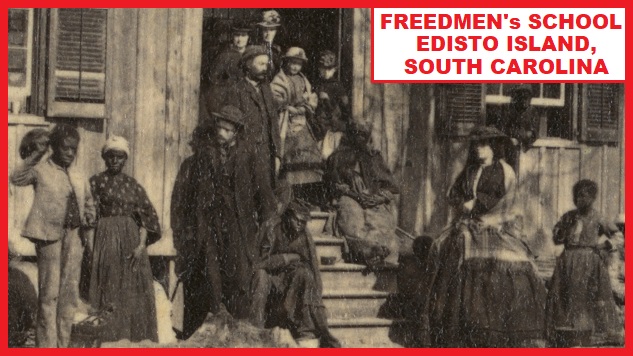 Columbus KY had a Freedmen School like this one in South Carolina. After the Confederates left Columbus, KY, it became an important Union Army and Navy supply depot. It also became a refugee center for former slaves among which was raised the 4th US Colored Heavy Artillery Regiment.
From 1866 to 1868 Columbus served as our regional center for the Freedmen's Bureau which had been formed to help the former slaves. Schools were set up for both children and adults, marriages were formally recognized, legal advice offered, courses and a savings bank established, labor contracts were negotiated and enforced, medical and food aid supplied, and disabled former soldiers were helped to obtain their pensions. The Union Army garrison at Columbus provided protection for both the Bureau's employees and for the former slaves from the hostility of most local whites.
But this proved to be only temporary.
In 1868 all the Freedmen's Bureaus except the one in Louisville were forced out of Kentucky through political pressure. The Louisville Freedmen's Bureau was finally closed in 1872. The fate of the former slaves came back into the hands of the local whites. And we all know what happened after that.
The following is a rare glimpse of the early post war situation in Columbus.
The below except is a combination of two versions. One without any author's name, from the June 1867 "The American Missionary" magazine, is shorter but contains several names left out in a later longer version. The longer version is from the 1869 book "The Freedmen of the South" by Linda Warfel Slaughter.
Before her marriage Linda Warfel was a Freedmen's Bureau teacher at Columbus, KY. I believe Linda wrote the below. I also think she followed the Victorian convention of leaving out her own name as far as possible. The words in brackets are mine. The parentheses are in the originals. "On the 23d of "Feb. last [1867 in the short version but 1868 in the longer one], in company with Rose T. Brower [of Ohio]" , in company, I came to this place [Columbus, KY] and organized the mission schools.
There are over one thousand Freedmen in the city alone, and from six to seven thousand altogether in this (Hickman) county and the adjoining counties of Fulton and Ballard. Our school with one exception (Paducah) is the only one west of the Cumberland [River], and though put in operation so recently, boasts a respectable number of pupils. A large, rudely constructed school building has just been erected, which will answer nicely in summer, but is very uncomfortable at present.
Our pupils attend regularly, and are eager for instruction. Most of the people we have visited appear to be quite 'religious' as the phrase goes, that is they belong to 'meeting,' and have knowledge of Heaven and a place of punishment; but the story of the life and death of our Savior is new to them, and they listen with pleased interest to its recital.
The citizens of Columbus are bitterly opposed to educating the freedmen, and we are made to feel constantly that we are in the 'enemy's country.' Much of the opposition seems to arise from the non-education of the whites themselves. They are just beginning to feel their own deficiency in this respect, and it mortifies them to see the negro receiving advantages which they and their children have never enjoyed.
This was fitly illustrated by the remark of a rebel lady to whom I had spoken respecting the progress of our pupils. Lamenting her own lack of education, she said, 'Since it's got fashionable to "teach the ... [negroes] I feel as if I'd like to know" a little somethin' myself.' Thus it is probable that the impetus given to education by the colored schools will lead in time to the institution of better schools for the white children of the South.
Many outrages have been perpetrated upon the freedmen this spring, and several unprovoked murders were committed during the past two months. It is rare, indeed, to find a case in which they have been fairly recompensed for their labor by their white employers. The State laws are insufficient for the protection of freedmen and poor Unionists, and, in fact, are almost wholly inoperative, as far as the freedmen are concerned.
We find a strong feeling of gratitude toward the mission teacher and bureau agents. Often while passing the rooms of shanties, Lieut. Bolton, agent of the Bureau is saluted with, 'Dar go de Freedmen Bureau, may de good Lord bress him' and similar ejaculations. In many ways they show their regard for us, and the mission work, though attended with many dangers and hardships, is still the most pleasant in which I have ever engaged. It is full of pleasing incident, instructive experience, and labor that is its own reward." |







